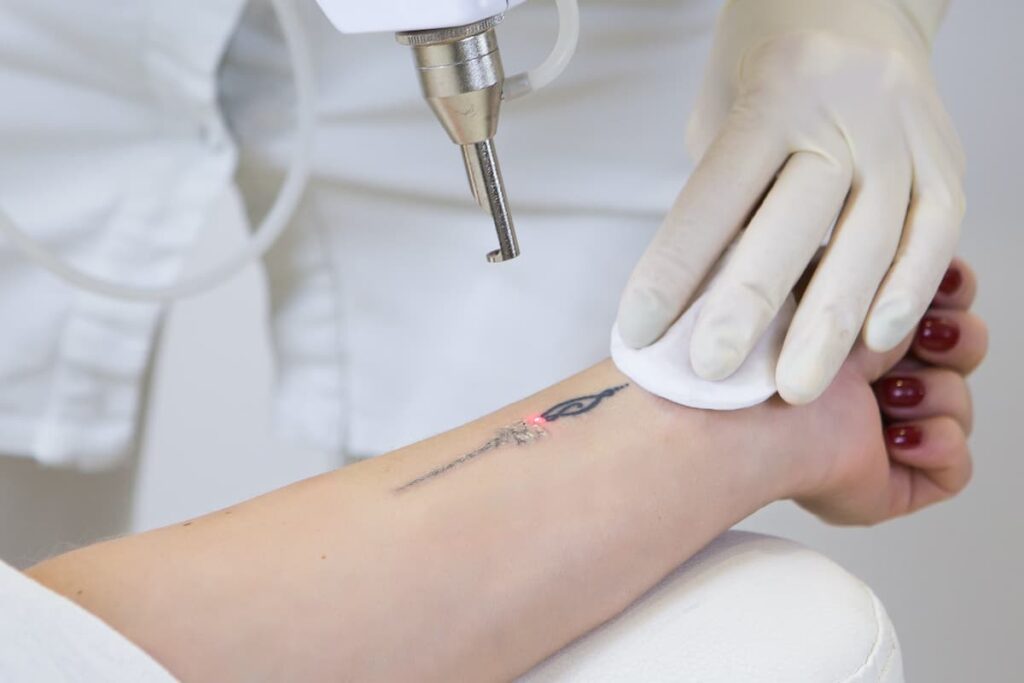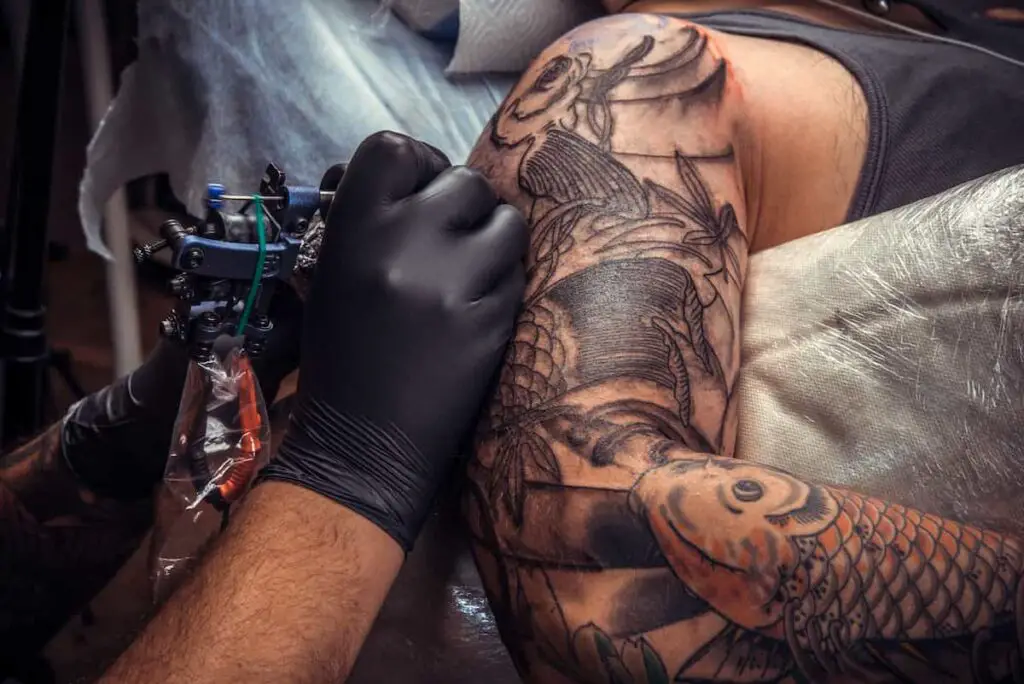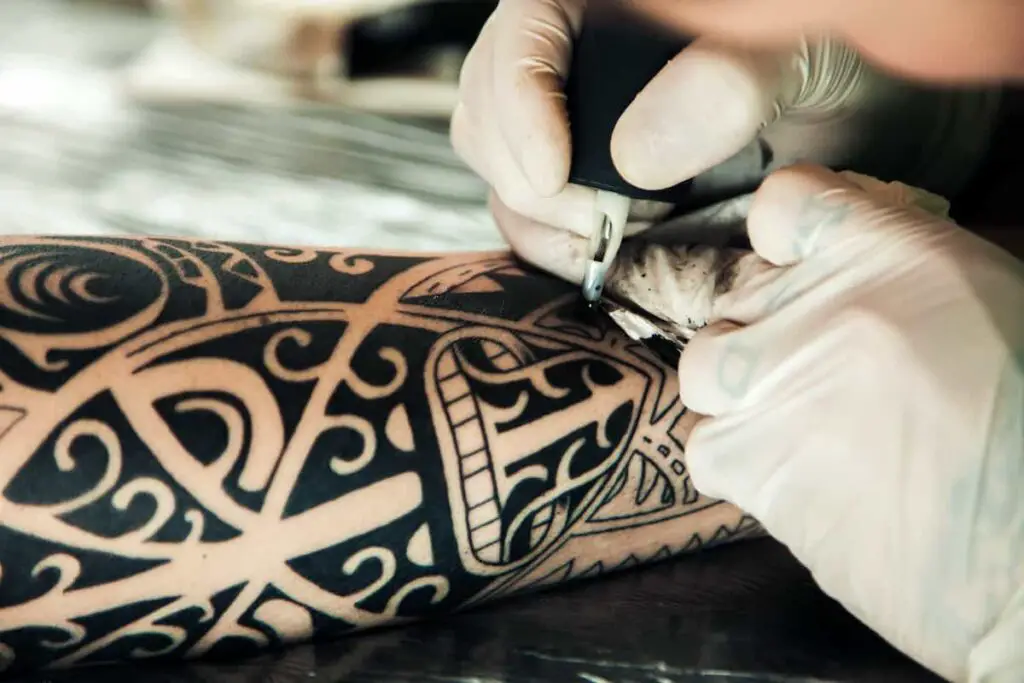A tattoo artist’s earnings are influenced by their client base, specialization in specific tattoo types, and frequency of bookings for events and conventions. Experienced artists with strong portfolios typically command higher wages than those just starting.
Ultimately, a tattoo artist’s income is determined by their skill level and reputation in the industry.
If you’ve ever wondered “How much do tattoo artists make,” either because you’re interested in working as one or you’re just a curious client, keep reading to get the answers to this question!

Factors That Impact How Much a Tattoo Artist Makes
Tattoo artists have many opportunities to make money, but how much they earn will change from scenario to scenario. Location and specialization also matter and can impact how much a tattoo artist makes.
A tattoo artist’s experience plays a significant role; those with more experience and better portfolios earn significantly more than newbies. Ultimately, how much tattoo artists make will depend on how well they market themselves and how valuable clients perceive their services.
Attending or registering for events or conventions may present an opportunity for tattoo artists to earn higher rates for their services, which could serve as an additional source of income.
Geographic Location
When it comes to a tattoo artist’s salary, geographic location counts. The average salary for a tattoo artist in big cities like New York or Los Angeles may be significantly higher than in smaller towns or rural areas.
Typically, tattoo artists in larger cities are in higher demand, so that they can charge more for their services. Increased access to attending events or conventions is a factor as well. These are opportunities to both meet new clients and expand your skills.
Don’t rule out the opportunity an underserved rural community can present. If a population is interested in tattoos but must drive hundreds of miles to find a good artist, your shop could thrive.
Experience and Reputation
Their experience and reputation significantly influence a tattoo artist’s income. More experienced artists can demand higher rates for their services. At the same time, a positive reputation within the industry can lead to a more extensive client base and increased income.
Furthermore, referrals from satisfied customers are invaluable for building an artist’s reputation and increasing their popularity in the industry.
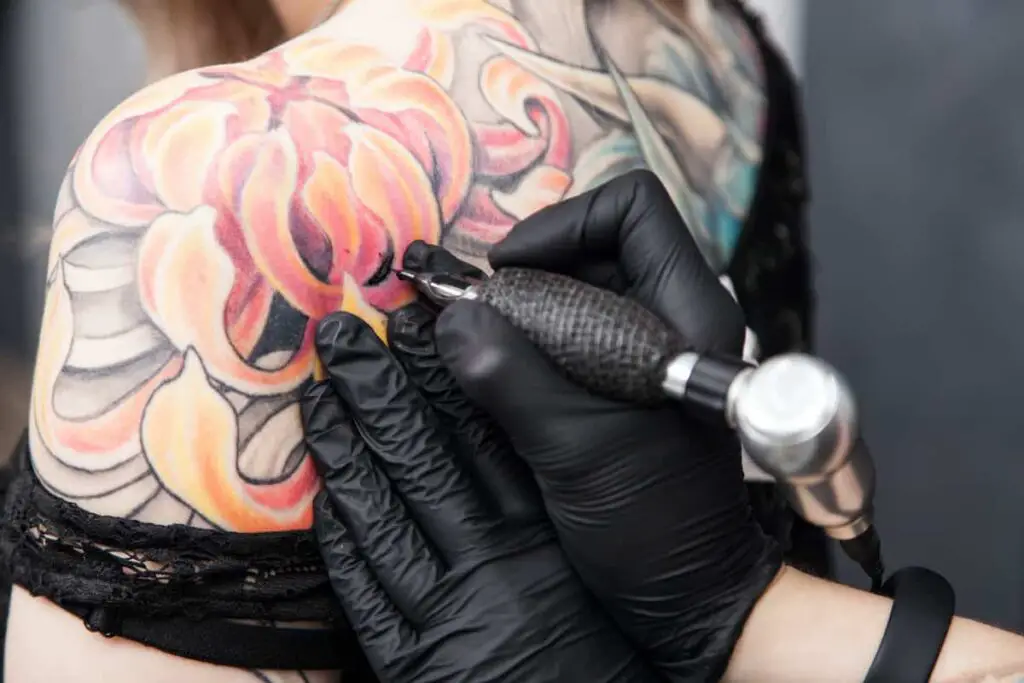
Location and Studio Type
Location and studio type can also affect how much money tattoo artists make. Artists who are located in popular or high-end areas may be able to charge more for their services than those based in less desirable parts of town.
The type of studio an artist works from can also affect how much they can earn. For example, those who work from larger, more established studios with a good reputation may be able to charge more than independent artists working out of their own homes.
Many top-tier studios have the resources to provide better training and equipment, enabling artists to create higher-quality tattoos and charge more for their services.
Aspiring tattooists should carefully consider where they want to set up shop and what kind of services they will offer if they hope to maximize their earning potential.
Building Client Base and Demand
The key to making a good living as a tattoo artist is having a built-up client base and consistent demand for your services. Having repeat customers is essential, and they help create a steady and reliable income stream. Word of mouth from satisfied customers will often lead to new clients.
Establishing an online presence through platforms such as Instagram or Facebook can be another great way to attract customers. The quality of your tattoos and the customer service you provide are the most critical factors. Success in those areas will help you build a positive reputation that keeps people returning for more.
Artist Specialization
Specialization is crucial for tattoo artists who wish to enhance their income. The more specialized an artist is in style, the more valuable their services are to potential customers. For instance, specializing in Japanese-style tattoos or ‘black and gray’ designs can lead to higher rates due to the growing demand for these types of tattoos.
Consider the value of specializing in specific body parts, such as sleeves or back pieces. Expertise in a particular area can give you an advantage over your competitors. Customers want to know they are seeing the best artist for their unique service.
Invest the time to hone your skills and become an expert in your desired niche. Specialization can help you stand out from competing tattoo artists and ultimately result in higher pay.
How Much Do Tattoo Artists Make?
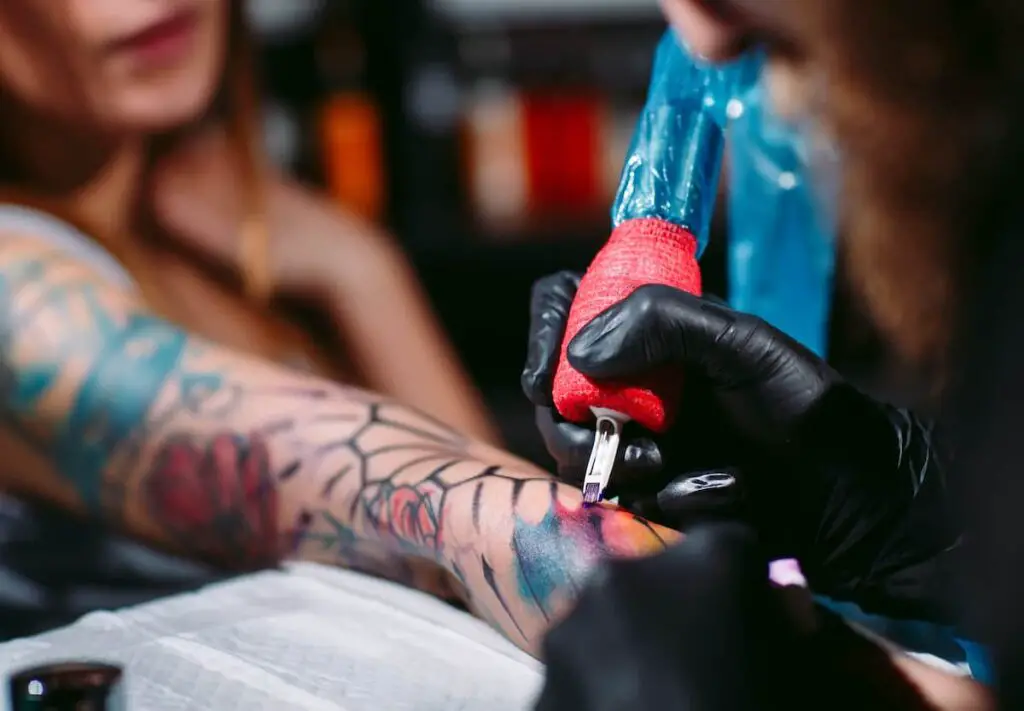
Tattoo artists are often glamorized on reality TV and social media, but many don’t realize how much they make. The average income of a tattoo artist varies greatly depending on the artist’s experience level, location, and specialization. Generally, a beginning artist will make around $30,000 to $50,000 annually. More experienced and specialized artists can earn up to six figures.
Tattooing is also a popular career choice for those looking to be their own boss. You can set your rates, and working freelance can lead to significant returns if you can attract the right clients.
National and Regional Salary Averages
Regarding salary averages, the national average for tattoo artists is around $41,000 per year. However, earnings can vary greatly depending on your area of expertise, region, and popularity as an artist. For example, highly sought-after artists in cities such as Los Angeles or New York may earn up to six figures. On the other hand, a beginning artist in a rural area may only make it closer to the national average.
Don’t forget that one of the perks of being a tattoo artist is setting your own rates and working freelance. Freelancing allows you to control how much money you’re making and will enable you to make more if your services are in high demand.
No matter where you decide to practice your craft, it’s important to remember that it takes time and dedication to build up a successful business as a tattoo artist. Be prepared for the long haul!
Tattoo Shop Owner’s Income
If you have an entrepreneurial spirit and a passion for tattoos, opening your own tattoo shop could be a viable option. While starting any business can seem daunting, the potential benefits make it worthwhile. Tattoo shop owners generally earn between $40,000 and $100,000 annually.
Establishing yourself as a successful business owner in the tattoo industry requires commitment and time. You’ll need access to top-notch supplies, equipment, and knowledgeable staff who understand the workings of a thriving business. Strong customer service skills are also essential, as customers rely on your expertise.
Owning a thriving tattoo shop demands perseverance and hard work. But invest the necessary time and effort into growing your business. The rewards can be incredibly satisfying, both financially and personally!
Other Income Streams for Tattoo Artists

Apart from owning a tattoo shop, there are alternative ways for tattoo artists to increase their earnings.
With the popularity of tattoos on the rise, more people than ever before are interested in learning how to do them themselves. Teaching classes and workshops allows seasoned professionals to pass on their knowledge. You can share your expertise with budding enthusiasts while being paid for your time.
Many successful tattoo artists have begun selling merchandise featuring their artwork as a way to supplement their income. These items can range from prints of existing designs to t-shirts and mugs depicting popular works. No matter the medium, they can be sold conveniently online or at local markets for a profit.
Becoming a successful tattoo artist requires dedication and hard work – but plenty of opportunities are available to make money if you’re willing to put in the effort necessary.
Commission vs. Hourly Pay
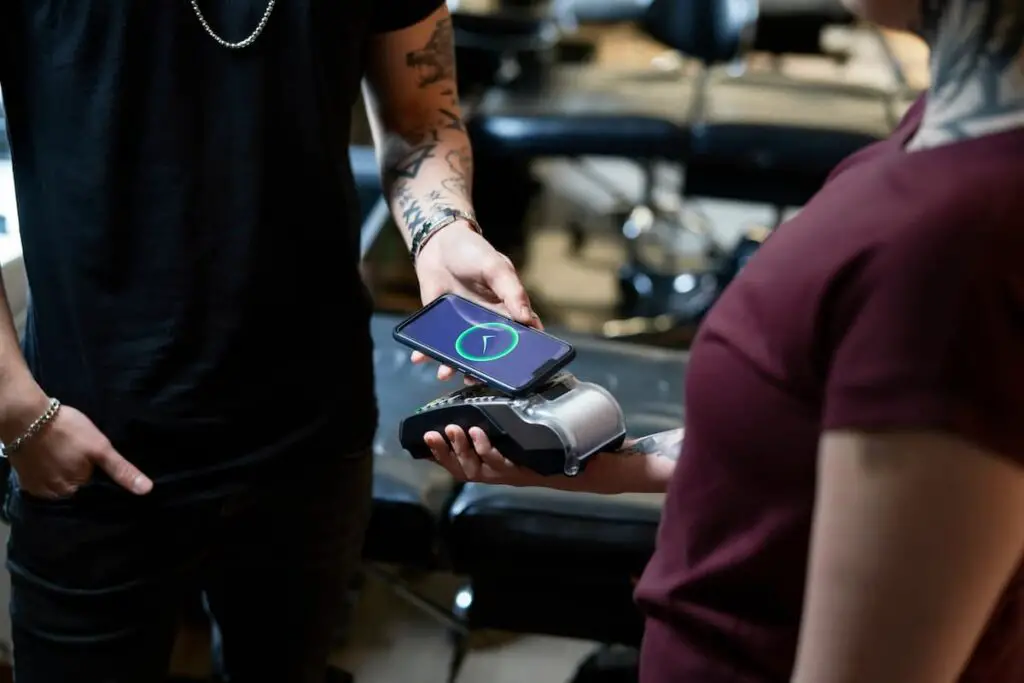
When considering income as a tattoo artist, deciding between commission-based pay or hourly wages is essential. Commission-based pay offers more long-term earning potential, allowing artists to set their rates and earn more per hour. However, hourly wages may be more suitable for beginners due to the stability and predictability they provide.
Hourly wages offer greater certainty for those with fewer clients or less experience in the industry. This type of pay also benefits artists who need a consistent income each week or month to cover their costs.
On the other hand, commission-based pay can be more profitable once you’ve established yourself. This type of pay allows you to choose your rates and the flexibility to take on larger jobs to generate higher profits.
Ultimately, the choice between working for an hourly wage or taking on commissions is up to you – but weighing your options carefully before deciding is essential.
How commission-based pay works in the tattoo industry
In the tattoo industry, commission-based pay is a popular method of earning money. A commission payment structure operates by charging a flat fee to customers for each artwork, regardless of how long it takes to finish the project. Collecting fees in this way allows artists to make more money than they would by charging hourly since they are paid for the entire piece rather than the time spent working on it.
Commission-based pay can be an excellent way for experienced tattoo artists to earn more money. However, it requires organization and efficiency to ensure each job is profitable. Knowing which types of tattoos command higher rates can help you focus on those projects, allowing you to maximize your earning potential. It’s also important to stay informed about market trends to adjust your prices accordingly.
Potential for Career Growth
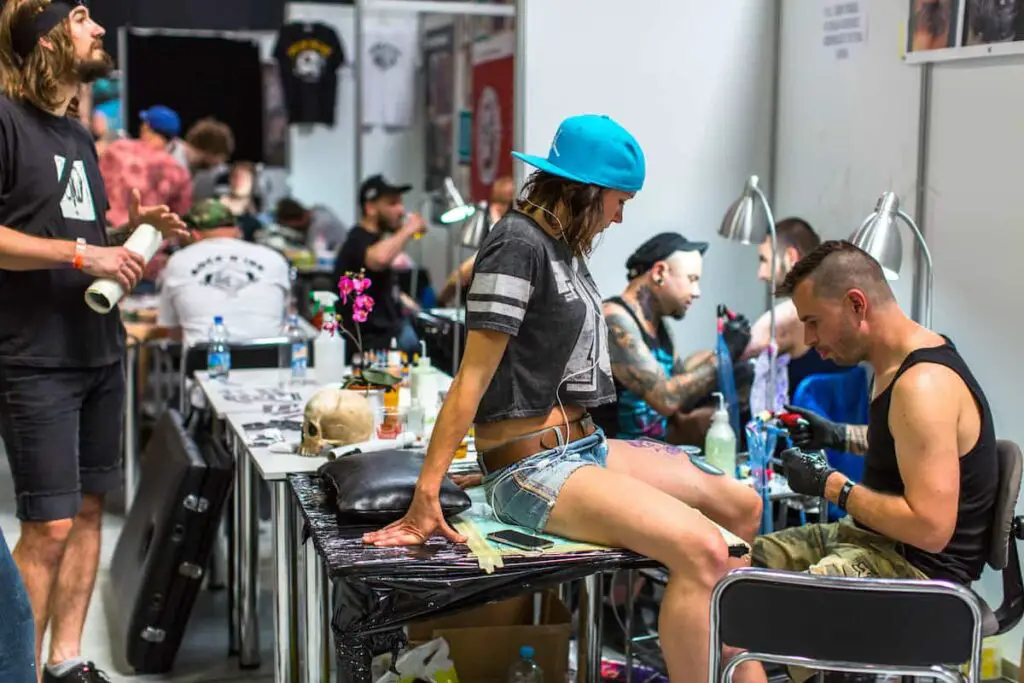
The tattoo industry offers vast potential for career growth. As an artist, you can refine your craft, master various techniques, and expand your portfolio. With each new job or project, you can gain additional experience and explore different aspects of the art form.
For instance, if you specialize in black and gray tattoos, you may take on a project requiring color work or offer personalized designs. This change not only allows you to grow as an artist but also enables you to increase your earnings by accepting more complex projects with more significant payouts.
Remember, experienced tattoo artists with the appropriate marketing and networking skills can even establish their businesses and hire other artists!
How Tattoo Artists Can Increase Their Income Over Time
Tattoo artists have the potential to enhance their earnings as they gain more experience in the industry. Practice is essential. Refining skills to become an expert in various techniques and styles will create avenues for more intricate projects and designs. The more complicated the project, the higher the compensation.
Successful tattoo artists often branch out into teaching, attending conventions, and launching their own businesses. Networking with other professionals in the industry remains vital no matter how established you become. A solid network can help you build relationships with potential employers, create connections within the tattoo community, and generate referrals from satisfied clients.
But it is a marathon, not a sprint, and tattoo artists who want to see their incomes steadily grow over time are reminded to be patient.
Opportunities for Career Advancement
As a tattoo artist, there are plenty of opportunities for career advancement. One option is to open your own shop and become an independent artist.
Shop ownership can involve renting space in a studio, buying equipment and supplies, and hiring staff. It’s a great way to build your brand and showcase your work to a larger audience.
How to Stay Competitive in the Tattoo Industry
To remain competitive in the tattoo industry, you need to consider the following tips:
• Network: Attend industry events to meet and interact with other professionals in your field. Networking allows you to exchange ideas, obtain feedback on your work, and establish valuable connections.
• Pursue education: Keep learning by pursuing certification in advanced techniques or taking classes to improve your skills. Education can make you more attractive to potential clients or employers.
• Stay current: Stay up-to-date on new styles and techniques that are popular in the industry.
• Update your portfolio: Keep your portfolio up-to-date with your best work. A strong portfolio attracts more clients and offers more industry growth opportunities.
By following these tips, you can stay competitive and progress professionally as a tattoo artist.
Wrapping up How Much Tattoo Artists Make
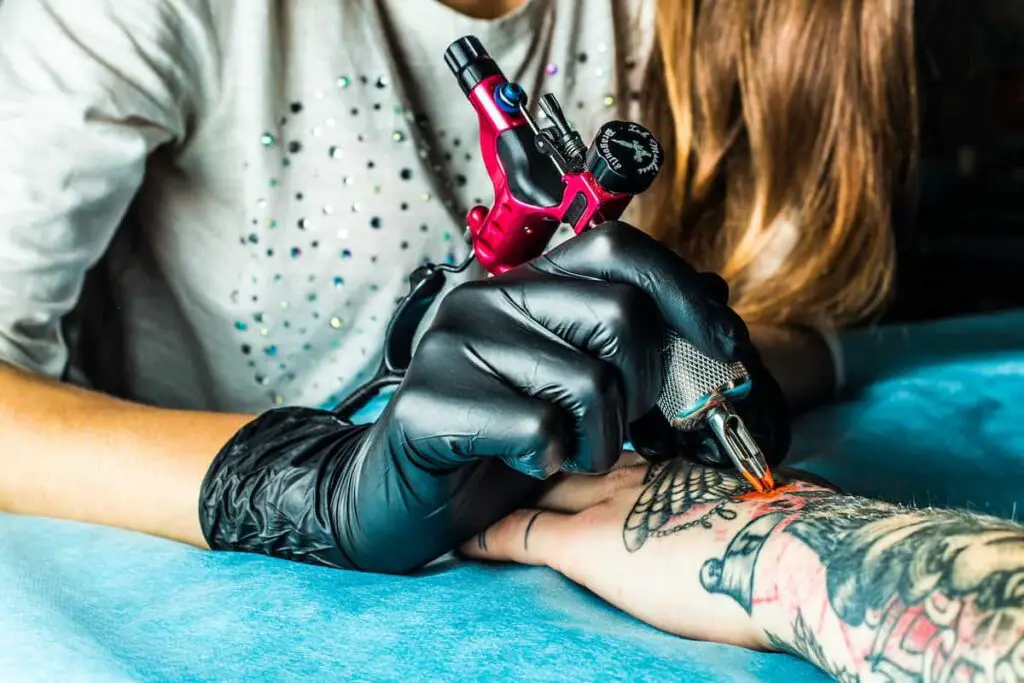
Like many other artistic pursuits, as a tattoo artist, the more time you dedicate to your skills, the more you can earn. From apprenticeship and specialization to shop ownership and teaching others, you can find many income opportunities as a tattoo artist.
Are you ready to expand your knowledge of the tattoo industry further? Learning about the tools of the trade is essential, so start with the Best Tattoo Guns for 2023. You’ll be ready to talk shop in no time!

